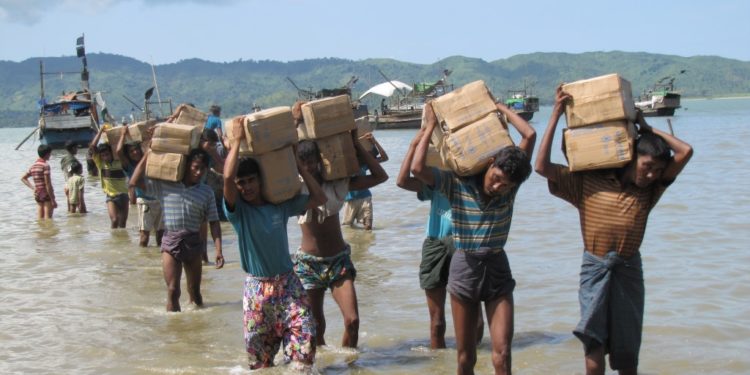By Susan Kendi
The International Criminal Court (ICC) has authorized the prosecutor to proceed with the investigation in Bangladesh and Myanmar for the alleged crimes against the Rohingya people.
This comes three days after the Gambia filed a genocide case against Myanmar before the International Court of Justice (ICJ) on Monday, November 11, 2019, on the ongoing abuses against the Rohingya.
“The Gambia’s legal action triggers a judicial process before the world’s highest court that could determine that Myanmar’s atrocities against the Rohingya violate the Genocide Convention,” said Param-Preet Singh, associate international justice director at Human Rights Watch.
The 1948 Convention on the Prevention and Punishment of Crime of Genocide allows member states that are party to the convention to bring a dispute before ICJ in case another country breaks the convention, requesting provisional measures to be instituted to stop ongoing abuses.
Myanmar has been a party to the Genocide Convention since 1956.
The first Genocide convention case was filed against Serbia in March 20, 1993.Bosnia accused Serbia for having “masterminded a genocide during the Bosnian war of 1992-1995.”
Crimes against the Rohingya people have been reported since 2012 but rose to a new level on August 2017 when there was a “clearance operation” targeting to deport the remaining Rohingya across the border to Bangladesh.
According to a submission made by the ICC prosecutor, Fatou Bensouda, Myanmar security forces collaborated with other individuals to attack the Rohingya population in a “well-organised, coordinated and systematic” manner especially in Rakhine state, with an intention of driving the population out of the country.
The alleged attacks entail killings, rape, torture, and enforced disappearances, destruction and looting of hundreds of villages, as well as livestock, crops and other personal property. The perpetrators seem to have targeted in particular people and objects representing the cultural and religious identity of the Rohingya.
The Rohingya minority has suffered years of persecution within Myanmar which includes the stripping of their Myanmar citizenship and other fundamental rights.
Bangladesh is a party to the Rome Statute but Myanmar is not.
Timelines
September 11, 2017
The UN High Commissioner for Human Rights describes the Rohingya crisis as “a textbook example of ethnic cleansing”, and according to the UN Special Envoy for human rights in Myanmar, potentially bears the “hallmarks of a genocide.”
April 9, 2018
The ICC prosecutor, Fatou Bensouda seeks a ruling on whether the Court may exercise jurisdiction over the alleged deportation of the Rohingya people from Myanmar to Bangladesh.
Bensouda argued that irrespective of Myanmar not being a party to the Rome Statute, the Court may still exercise jurisdiction because the deportation occurred across the international border into Bangladesh which is a party to the Rome Statute.
According to the court record, consistent and credible public reports reviewed by the prosecution revealed that since August 2017 more than 670,000 Rohingya, lawfully present in Myanmar, have been intentionally deported across the international border into Bangladesh.
May 7, 2018
The president of the Pre-Trial Division assigns the request to the chamber, which then invites the competent authorities of Bangladesh to submit written observations by June 11, 2018 on the Prosecutor’s request.
May 29 to June 14, 2018
The chamber allows certain individuals and organisations to submit their amici curiae observations on the prosecutor’s request.
September 6, 2018
The International Criminal Court in 2-1 decision rules that it may exercise jurisdiction over the alleged deportation of the Rohingya people from Myanmar to Bangladesh.
In a 50 page decision with one judge dissenting, the majority explain that although Myanmar is not a state party of the Rome Statute, deportation begins in a non-state party by use of force or threats and completed by crossing a border into a state that is a treaty signatory, Bangladesh.
September 20, 2018
Canada’s parliament (House of Commons) in a unanimous vote declare the ethnic cleansing against the Rohingya as an act of genocide.
April 13, 2018
The Government of Myanmar issues a statement stressing that it is not a party to the Rome Statute.
“Nowhere in the ICC charter does it say that the court has jurisdiction over states which have not accepted that jurisdiction. The UN Vienna Convention on international treaties states that no treaty can be imposed on a country that has not ratified it.”
August 9, 2018
The Myanmar government refuses to respond to the prosecutor’s request citing several concerns such as bad faith, irregularities on procedure and the lack of fairness and transparency on the litigation process.
July 4, 2019
Bensouda seeks permission from the Pre-trial Chamber Judges to proceed with the investigation into the Bangladesh and Myanmar for crimes committed since October 9, 2016.
September 16, 2019
During the 42 nd session of the Human Rights Council, the detailed findings of the Independent International Fact-Finding Mission on Myanmar were presented.
“The situation of the Rohingya in Rakhine State has remained largely unchanged since last year… The Government of Myanmar has made no progress towards addressing the underlying structural discrimination against the Rohingya by amending the discriminatory laws, including the 1982 Citizenship Law… “the findings stated.
“The laws, policies and practices that formed the basis of the Government’s persecution against the Rohingya have been maintained…Rohingya remain the target of a Government attack aimed at erasing the identity and removing them from Myanmar…”
November 11, 2019
Gambia files a genocide case against Myanmar before ICJ as a violation of the 1948 Convention on the Prevention and Punishment of Crime of Genocide which they are both parties to.
November 14, 2019
ICC Judges authorise the prosecutor to proceed with the investigation in Bangladesh and Myanmar for the alleged crimes against the Rohingya people.







